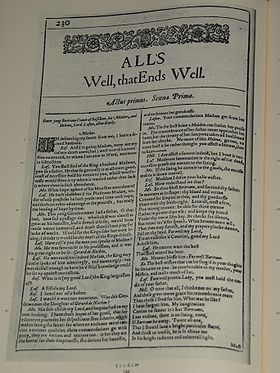- All's Well That Ends Well
-
Tout est bien qui finit bien
Tout est bien qui finit bien Auteur Shakespeare Genre Comédie Pays d'origine  Angleterre
AngleterreLieu de parution Londres Éditeur Edward Blount et Isaac Jaggard Date de parution 1623 Date de la 1re représentation 1741 Lieu de la 1re représentation Goodman’s Fields Tout est bien qui finit bien est une comédie écrite par William Shakespeare probablement entre 1601 et 1608.
Personnages
- Le Roi de France ;
- Le Duc de Florence ;
- Bertrand, comte de Roussillon ;
- Lafeu, vieux courtisan ;
- Parolles, parasite à la suite de Bertrand ;
- Plusieurs jeunes seigneurs français, qui servent avec Bertrand dans la guerre de Florence ;
- Un intendant, au service de la comtesse ;
- Un paysan bouffon, au service de la comtesse de Roussillon ;
- La comtesse de Roussillon, mère de Bertrand ;
- Hélène, protégée de la comtesse ;
- Une vieille veuve de Florence ;
- Diane, fille de cette veuve ;
- Violenta, voisine et amie de la veuve ;
- Mariana, voisine et amie de la veuve ;
- Seigneurs de la cour du roi ;
- Un page, Officiers, Soldats français et florentins.
Argument
La scène est tantôt en France, tantôt en Toscane. C’est l’histoire d’une fille du peuple, Héléna, amoureuse d’un jeune seigneur, Bertram - le fils de la comtesse chez qui elle est servante. Lui, en revanche...
Classée souvent dans les comédies « à problème » parce que la pièce ne peut être considérée ni comme une tragédie ni comme une comédie, c’est une des pièces de Shakespeare les moins jouées, en partie à cause de l’étrange mixité de logique de conte de fée et de réalisme cynique.
La scène finale, dans laquelle le personnage de Bertram fait volte face de la haine à l’amour en une seule réplique, est réputée chez les acteurs anglais être l’une des principales difficultés d’interprétation pour les tenants du réalisme psychologique.
Le personnage d’Héléna a été critiqué par les auteurs de l’époque victorienne qui la considéraient dépourvue de féminité, à cause de ses exigences autoritaires. En revanche, le public moderne à tendance à la voir d’un caractère particulièrement faible, pour rester avec un époux tellement évidemment indigne d’elle.
Un personnage fortement admiré est celui de la Comtesse, rôle très prisé des actrices de théâtre d’un certain âge. Dans les mises en scène anglaises modernes, ce rôle est fréquemment interprété par de grandes vedettes confirmées telles que Judi Dench ou encore Peggy Ashcroft.
- Portail du théâtre
Catégorie : Comédie de William Shakespeare
Wikimedia Foundation. 2010.

